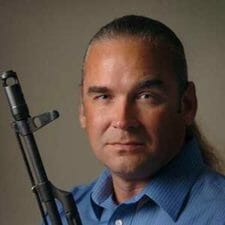Founders wanted to create similar special operations units across a coalition of states that would not be subject to federal oversight or presidential authority.

When Florida Gov. Ron DeSantis announced that he was “reactivating” the Florida State Guard nearly two years ago, veteran special operators and business partners Brandon Graves and Tom Morton knew they could contribute, so they locked themselves in their office and began writing an unsolicited proposal that they planned to send to the governor’s team.
Graves and Morton recently opened Stronghold SOF Solutions, a one-of-a-kind tactical training facility located in Florida’s Panhandle. Stronghold’s training staff are all former special operators. The 50-acre facility is just minutes from the 7th Special Forces Group. Just a few of Stronghold’s offerings include a two-story live-fire shooting house, a 4160-foot runway, four 360-degree dynamic ranges, MOUT/SOUC sites, an underground training facility and a demolition range that can support up to 40-pound charges. The facility has a clubhouse, drone-friendly airspace and helos – a Soviet-designed Mi-17 and a Boeing MH-6, better known as a Little Bird, which has become the taxi of choice for many special operators.
In their proposal, Graves and Morton wrote of an untapped resource – retired special operations veterans – who would be the perfect force to fulfil FSG’s mission of responding to natural or manmade disasters. They offered to select, train and validate a 60-man special operations force.
“We got their attention in Tallahassee,” Graves said. “They were excited about it.”
Morton said the concept they floated in their proposal is the same concept that led to the creation of Stronghold.
“One reason we built this place was to be a stronghold for our colleagues getting out,” he said. “We wanted this to be a place to help guys springboard into their next life. GWOT (Global War on Terror) is basically over, and there are thousands of guys with 20 or more years of experience in special operations, which cost the government millions of dollars to produce. We’re trying to leverage that talent and make it available to this state and other states.”
Florida awarded Stronghold SOF Solutions a no-bid contract worth up to $1.2 million. Graves and Morton knew the legacy media would push back against their efforts, yet neither special operator anticipated the ferocity of the media’s attack.
A 450-year history
The Florida State Guard traced its lineage to 1565, when the Spanish in St. Augustine stood up to the first company of armed citizen volunteers, according to the FSG website.
Three-hundred and seventy-six years later, in 1941, President Franklin D. Roosevelt federalized many states’ National Guard units and sent them to war. In response, the Florida Legislature created today’s Florida State Guard to safeguard the Sunshine State.
On June 14, 2022, DeSantis announced he was reactivating the FSG with a “statewide rapid response land-based, maritime, and aviation capabilities.”
Last week, 205 candidates passed the FSG’s three-week Initial Entry Training and will join the 120 State Guardsmen who were already part of the group.
“The Florida State Guard serves an important role in emergency response for the state. I am pleased to see this important volunteer force continue to grow to serve the people of Florida,” DeSantis said in a statement.
While many of these candidates had prior military service, they should not be confused with the 60-man special operations force Graves and Morton helped create, which is known officially as the Florida State Guard Special Operations Company, or SOC.

Special Operations Company
The SOC is chock-full of tabs, tridents, wings and berets. Its members include former Navy SEALs, Army Rangers, Special Forces, MARSOC Marines, Air Force Special Operations veterans and more.
“Every one of them has the SOF mindset,” Graves said. “We vetted and trained all of them.”
The state agreed to purchase guns and gear for the SOC. As it stands now, the 60 members are issued Sig-Sauer P-320 9mm handguns and Sig-Sauer MCX-SPEAR Carbines.
The kit state officials purchased for the SOC leaves little to be desired. However, special operators are seldom satisfied with any issued gear.

Three things at once
The state contract required Stronghold to “select, train and validate” a 60-man force in just two weeks.
“Those three aspects of a training environment are located at different points in a SOF unit’s work-up cycle,” Morton said. “And we had two weeks to do all of that. Fortunately for the SOF community, training never really stops. We piggy-backed off of the military’s investment. We really just needed to perform a function check, to make sure all the skills were still there.”
Stronghold’s trainers started with a series of rifle and pistol qualifications on a flat range, along with vehicle work and bail-out drills. The trainers transitioned to battlefield medical training, using Special Forces 18-Delta medics. All members are now certified in TCCC (Tactical Combat Casualty Care).
During week one, the operators worked on individual Close Quarters Battle skills in the shoot house. “We were watching closely,” Morton said. “We were taking metrics of everything.”
During week two they focused on team-based skills, including aircraft operations with the Mi-17 and Little Bird. The second week added maritime skills, which were taught by a Coast Guardsman and Navy SEALs and included VBSS (Visit Board Search and Seizure) missions in the Gulf of Mexico.
“The best way to think about this training is less military and more like Coast Guard or law enforcement stops out on the water,” Morton said.
Toward the end of week two, the students were put through validating exercises – full mission profiles of maritime interdictions on the water, and hostage rescue missions using simulations, which were conducted in the shoot house.
“They received their warning order, planned, moved to the shoot house, entered, cleared and exfilled,” Graves said. “We had excellent role players who would escalate their behavior during the training. It started with verbal abuse, throwing things away, then brandishing a weapon but not pointing it. In the final escalation, the role player would point and shoot. We were really hyper-focused on when to use force. These guys really shouldn’t need to go to that level yet. We want to make sure they’re ready, but we don’t anticipate anything close to that level of threat.”
Media Pushback
The legacy media has tried to label Graves a DeSantis supporter as if to imply that Stronghold’s no-bid contract was awarded for personal or political reasons. However, neither Gaves nor Morton or Stronghold have ever donated a dollar to any of DeSantis’ political campaigns. (Nor have they ever met DeSantis personally.)
This type of bashing was expected.
“It’s fair to say we quickly realized there was a political aspect to all of this,” Morton said. “Whenever politics are involved, the media is going to take every opportunity to spin it in a different way – their way. There are a lot of training companies out there, but I’m not aware of one like ours in the state of Florida – especially one with our facilities.”
What was not expected was the media’s bashing of an American hero.
“The engagement of a combat training company with links to an accused war criminal raises serious questions about the intentions of Florida Governor DeSantis’s civilian military force,” a reporter wrote of one Stronghold trainer, retired Navy SEAL Chief Eddie Gallagher.
"To single out Gallagher was a new low and extremely unfair," Morton said.
“If they really knew his story, he’s a guy who served his country for 20 years. He’s a true warfighter. He’s been in the worst situations. He pushed through Mosul, which was extreme. He took care of his guys. In my opinion, he is a great example of what a patriot should be. They really used all that against him. "Most of the media’s negative coverage that’s been pointed at us was through our relationship with Eddie,” Morton said.
To be clear, Gallagher ran afoul of the normal tension and distrust that exists between the conventional Navy and the extremely unconventional SEAL Teams. It’s something any special operator can face, regardless of their branch of service. Gallagher was charged with seven crimes but acquitted of six. President Trump immediately congratulated Gallagher via Twitter. Four weeks later, Trump ordered the Secretary of the Navy to revoke the Navy Achievement Medals, which were given to Gallagher’s prosecutors as a reward for their prosecution.
The Navy didn’t give up despite the acquittal and ordered Gallagher demoted from E-7 to E-6. Trump intervened and stopped the demotion cold. Undeterred, the Navy quickly convened a “Trident Review Board,” to determine whether Gallaher should be stripped of his SEAL Trident. For Trump, that was too much. He tweeted: “The Navy will NOT be taking away Warfighter and Navy Seal Eddie Gallagher’s Trident Pin. This case was handled very badly from the beginning. Get back to business!”
The Navy will NOT be taking away warfighter and Navy Seal Eddie Gallagher’s Trident Pin. This case was handled very badly from the beginning. Get back to business!
— Donald J. Trump (@realDonaldTrump) November 21, 2019
Graves has zero regrets. He and Morton consider Gallagher a close friend and one of their best instructors.
“In special operations, there are guys who are trained and guys who are experienced,” he said. “Eddie is both trained and experienced. From a practical standpoint, he is one of the best guys we can bring in. He is a confident, capable, highly experienced guy. Unfortunately, the system turned its teeth on him.”
New Federalism
Graves and Morton are in talks with officials in Texas and Louisiana who have expressed interest in creating special operations units in their states.
“It’s federalism – trying to get the decision-making back to the state level,” Graves said. “We need a system where the states can rely on each other. We can create similar units in a coalition of states if they put the financial means behind it. We can vet, train and run the exact program, so anytime there’s a manmade or natural disaster, the states can send each other resources.”
Morton added that they are not trying to replace federal resources. They want to give governors additional options.
“We are certainly not opposed to federal assistance,” Morton said. “What we are really getting at is trying to help the state create the environment where states have the means to solve their own problems.”
Said Graves: “The concept whereby states begin to arm themselves and build the capabilities of State Guards removes the ability of the federal government to leverage their assistance.”
This story was presented by the Second Amendment Foundation’s Investigative Journalism Project and wouldn’t be possible without you. Click here to make a tax-deductible donation to support more pro-gun stories like this.
About Lee Williams
Lee Williams, who is also known as “The Gun Writer,” is the chief editor of the Second Amendment Foundation’s Investigative Journalism Project. Until recently, he was also an editor for a daily newspaper in Florida. Before becoming editor, Lee was an investigative reporter at newspapers in three states and the U.S. Territory. Before becoming a journalist, he worked as a police officer. Before becoming a cop, Lee served in the Army. He’s earned more than a dozen national journalism awards as a reporter and three medals of valor as a cop. Lee is an avid tactical shooter.

